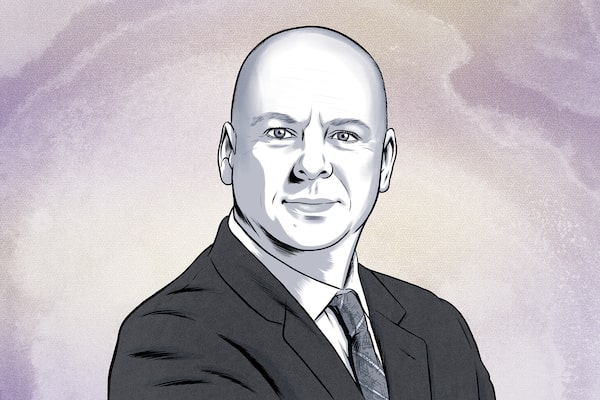
Thane Stenner of Canaccord Genuity Wealth Management Canada.The Globe and Mail
Sign up for the Globe Advisor weekly newsletter for professional financial advisers on our newsletter sign-up page. Get exclusive investment industry news and insights, the week’s top headlines, and what you and your clients need to know.
Money manager Thane Stenner isn’t sugarcoating where he sees the economy heading and why a huge chunk of his portfolio is in cash right now.
“We’re likely heading into a recession or will soon be in one … and it’s probably going to be a hard landing,” says Mr. Stenner, senior portfolio manager and senior wealth adviser with Stenner Wealth Partners+, which oversees about $1.75-billion in assets, at Canaccord Genuity Wealth Management Canada in Vancouver.
“I’m not being bearish for the sake of being bearish, but this is one of those times at which I think things will get a bit worse than people anticipated,” adds Mr. Stenner, pointing in particular to credit conditions he says are tightening “dramatically,” which often leads to a deeper downturn.
As a result, his portfolio is 58 per cent in cash, specifically money market funds paying about 5 per cent. That’s down slightly from 61 per cent a few weeks ago but well above his 5 per cent cash holdings about 15 months ago. Mr. Stenner says the typical range for his discretionary portfolios is about 5 to 10 per cent cash.
“We’re pretty defensive right now,” Mr. Stenner says, owing largely to his ultra-high-net-worth client base, which includes investors across Canada and the U.S. with minimum account sizes of $10-million, or families with a net worth of at least $25-million.
“They’re looking to preserve capital first and grow capital second. They don’t want huge volatility in their portfolios,” he says.
Mr. Stenner’s portfolio, which includes mostly exchange-traded funds (ETFs), is up 3 per cent year-to-date, based on total returns and net of fees. His performance was flat in 2022, which Mr. Stenner is proud of and says “was no easy feat” given the brutal year in the markets.
The Globe and Mail spoke with Mr. Stenner recently about what he’s been buying and selling and an ETF that he wished he had bought when it tanked earlier this year.
Describe your investing style.
We’re tactical investors and look for opportunities to buy securities at a deep value. We look for areas that are the most beaten up. We can invest anywhere in the world. We like that flexibility. We invest mostly in ETFs and look for the cheapest ones to create as much value as possible for our investors.
What have you been buying lately?
Earlier this week, we purchased some Japanese ETFs, taking a cue from Berkshire Hathaway Inc., which noted recently that it has been seeing some tremendous value in Japan. Based on forward price-earnings multiples, valuations are about 40 per cent cheaper there than the S&P 500. Cheap doesn’t guarantee returns, but it does manage risk. When someone like Warren Buffett highlights Japan, it’s pretty interesting.
We’ve also recently rebought some gold and silver mining ETFs after selling them about a month ago. I’m not a gold or silver bug, but that’s an area in which we think there’s potentially some very good money to be made over the next few years.
We also just bought some energy ETFs after they sold off because we saw some good value there. Typically, commodities start to do well when interest rates come down. We expect interest rates to come down later this year or early next year during a recession.
We also bought some long-duration bond ETFs about five months ago for similar reasons. If we’re heading into a recession, longer-term rates will start coming down, and longer-term bonds will increase in that environment. Long-term bonds are our biggest position right now after our high cash holdings.
What have you been selling?
We just sold some biotech ETFs we owned for about four months, taking a profit. We sold some technology holdings after they rallied in the first quarter of this year. We won’t be going back into tech for a while. We think there will be some earnings surprises over the next two or three quarters.
Name a stock you wish you bought or didn’t sell.
One we missed was the KraneShares CSI China Internet ETF KWEB-A, which was down about 80 per cent from its peak about four months ago. We wanted to buy it, but we got a little cute on the buy price and missed it. It went from less than US$18 a unit to US$35 in three months. Right now, it’s around US$28. If it sells off another 20 to 30 per cent, we’ll probably buy it.
What advice do you have for new investors?
Develop an investment policy statement for yourself, whether investing on your own or with an adviser. Include information such as what you will and won’t buy, how much you want to invest in certain sectors, your target rate of return, tax sensitivity, investment time horizon and liquidity needs. Consider it a checklist of what you will and won’t do, and stick with it. Of course, it’s easier said than done.
This interview has been edited and condensed.
For more from Globe Advisor, visit our homepage.